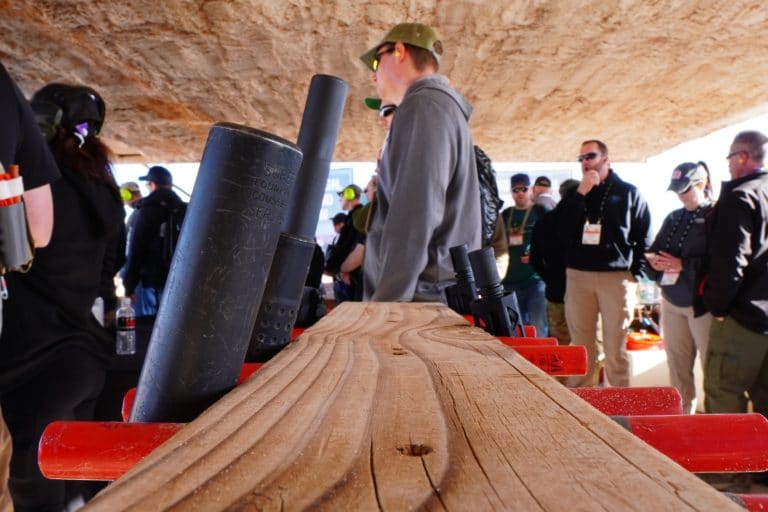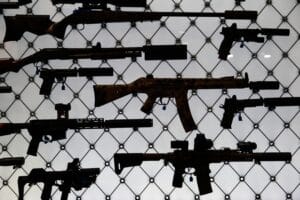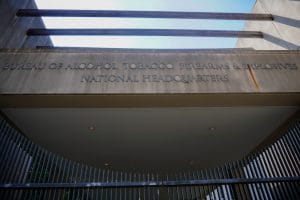Gun-rights advocates have been building momentum for silencer deregulation headed into the next Trump Administration. The assassination of a high-profile health insurance executive could scuttle that effort.
On Wednesday, a masked assailant shot and killed UnitedHealthcare CEO Brian Thompson outside a Manhattan hotel. While the identity and whereabouts of the gunman are still unclear, surveillance footage of the murder shows that he used a semi-automatic pistol equipped with some kind of silencer–more accurately labeled a sound suppressor by the industry. Because suppressors are almost never used in crime, that facet of that attack has already garnered significant media attention.
“In all of my years of law enforcement, I have never seen a silencer before,” New York City Mayor Eric Adams (D.) said in a MSNBC interview. “And so that was really something that was shocking to us all.”
Prior to the incident, gun-rights advocates had been riding a cultural wave of growing support for suppressors both within and even beyond the gun-owning community that they hope to translate into policy change.
The ATF dramatically improved its approval times for suppressor purchases earlier this year, down from several months to just a few days or even hours in some cases. This erased a practical hurdle that deterred many from buying in the past, and it coincided with a significant uptick in suppressor ownership.
In October, the National Shooting Sports Foundation released new data from the ATF that shows Americans own approximately 4.9 million suppressors. That’s up from the 2.6 million registered suppressors when the ATF last disclosed the data in May 2021.
In addition to the near doubling of civilian suppressor ownership over the last three years, a major medical organization publicly endorsed their usage for the first time late last month.
“Sound suppressors are mechanical devices attached to the barrel of a firearm designed to reduce harmful impulse noise of firearms at its source,” the American Academy of Otolaryngology–Head and Neck Surgery (AAO-HNS) statement reads. “CDC research has shown that ‘The only potentially effective noise control method to reduce [shooters’] noise exposure from gunfire is through the use of noise suppressors that can be attached to the end of the gun barrel.’ Suppressors reduce muzzle blast noise by up to 30 dB.”
In turn, gun-rights advocates are looking to press their political advantage next year with an incoming Republican trifecta led by a President-elect who has pledged to support their policy goals.
Beyond measures like national concealed carry reciprocity, one of the most common legislative goals pushed by gun-rights advocates in recent years has been suppressor deregulation. The Hearing Protection Act, which would remove suppressors from the purview of the National Firearms Act, has been introduced by Congressional Republicans multiple times in recent years and enjoys the backing of virtually every prominent gun-rights organization.
Passage of the act was already something of a long shot before Wednesday, given the narrow majorities Republicans will have in both the House and Senate and uncertain appetite across their membership. It has become even more challenging following the device being used in a high-profile murder that was caught on camera and broadcast across the globe.
The imagery of the killing will likely serve to reinforce the pre-existing public image that suppressors are primarily tools for assassins, making the fight that much harder for lawmakers and advocates. Gun-control groups have long argued suppressors are unnecessary for hearing protection, and the hearing-dangerous noise levels produced by unsuppressed gunshots are actually a sort of safety feature themselves because they do a better job of alerting people to an active shooting. But, much like Hollywood movies, they have also consistently framed the devices as mostly useful for killers trying to mask their attacks.
“In the wrong hands, such weapons can be used to ambush unsuspecting victims,” Greg Lickenbrock wrote of suppressed pistols in a story about Wednesday’s killing that was published by Everytown for Gun Safety.
Suppressor deregulation advocates will face an especially hard fight if they aren’t able to garner Donald Trump’s support, which is quite possible given the mercurial nature of the President-elect when it comes to gun policy. After all, the last time a suppressor was used in a high-profile crime—the 2019 Virginia Beach shooting—President Trump even flirted with the idea of banning them altogether.
“I’d like to think about it. I mean, nobody’s talking about silencers very much. I did talk about the bump stock, and we had it banned, and we’re looking at that,” Trump told Piers Morgan on Good Morning Britain in June 2019. “I’m going to seriously look at it.”
Beyond the prospect of federal de-regulatory reform being scuttled, the more likely venue for political fallout will be among the states. Only eight states (including New York) and the District of Columbia currently prohibit civilian ownership of suppressors, but lawmakers in the remaining 42 states could easily use the incident as a catalyst to join their ranks.
The state response to the sudden prominence of bump stocks is instructive here.
Bump stocks existed on the commercial market for many years in relative obscurity to all but the most dedicated of gun hobbyists and were seldom, if ever, involved in any violent crime. That was until a gunman used numerous firearms, some equipped with the devices, to murder 60 people at a Las Vegas concert in 2017. Though that remains one of the only high-profile instances of a bump stock being used in violent crime, it prompted the first Trump Administration to ban the devices by executive action that the Supreme Court declared unlawful, and 16 states (as well as some cities) quickly adopted bans of their own in the years that followed.
While the UnitedHealthcare CEO’s assassination doesn’t come close to the Vegas shooting in terms of the death toll, it is a highly visible heinous act that could lead to a similar cascading policy response.
It’s too early on in the aftermath of the killing to know for sure what the political reaction will be. Law enforcement has not yet caught the killer or recovered the weapon involved. So, we don’t even know if a commercial silencer was used. The shooter possibly could have used an oil filter, solvent trap, or some other makeshift contraption. That’s one possible explanation for why the shooter had so many weapon malfunctions during his attack.
The use of a makeshift or otherwise illegally procured suppressor could blunt the potential political fallout for deregulation advocates. After all, there wasn’t much of a serious movement to go after civilian suppressors after the Monterey Park mass shooting in January 2023, where a gunman killed 11 with a handgun outfitted with a homemade suppressor.
Either way, both the incident and the attention it’s received have likely worsened the odds of increasing public acceptance of suppressor ownership. It will be a taller task than before for gun-rights advocates to loosen the regulatory constraints around suppressors now that grainy surveillance video of a mystery man killing somebody in cold blood with one is playing on loop around the world–even if the suppressor likely did more to hinder than help him.







3 Responses
I can see where the ATF would want more suppressor ownership and even encourage it. What better way to achieve a huge part of gun owner registration, without obviously violating the law against registration?
I think it is possible that the shooter used sub-sonic ammo and that may have caused the weapon malfunctions.
It’s possible, yes. The police haven’t said anything about whether the ammo was subsonic yet.